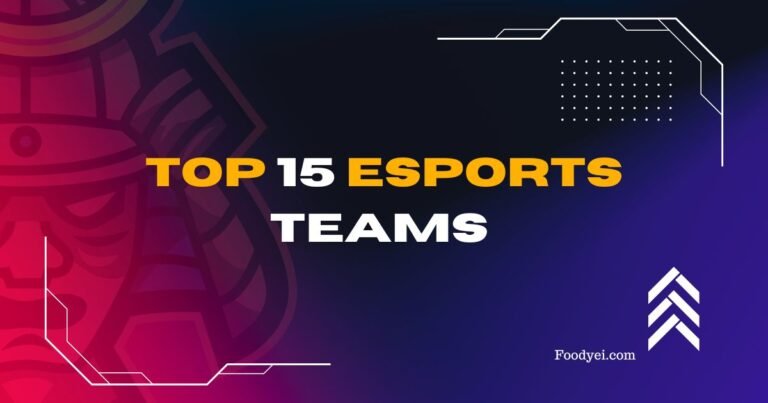The esports industry is evolving at lightning speed, and 2025 is no exception. From groundbreaking technologies to new competitive formats, innovation is at the core of esports’ explosive growth.
These advancements not only enhance player performance but also transform the fan experience, making esports more immersive and accessible than ever before. Let’s explore the top esports innovations shaping the industry in 2025.
1. Next-Gen Virtual Reality (VR) Integration
Immersive Gameplay
Virtual reality has been a game-changer for esports, and 2025 has pushed it to the next level. Players and fans can now:
- Compete in fully immersive VR arenas that replicate real-world stadiums.
- Engage in VR spectating, allowing fans to experience matches from a first-person perspective or any angle of their choice.
VR Training for Pro Players
Esports teams are leveraging VR for:
- Simulating high-pressure scenarios.
- Fine-tuning reflexes and decision-making in a controlled environment.

2. AI-Powered Coaching and Analysis
Real-Time Feedback
Artificial intelligence has revolutionized coaching by providing real-time feedback on player performance. Tools now:
- Analyze gameplay to identify strengths and weaknesses.
- Offer tailored strategies to counter opponents.
Predictive Analytics
AI also helps teams predict:
- Opponent tactics based on historical data.
- Optimal team compositions for specific matchups.
3. Enhanced Fan Interaction Through Augmented Reality (AR)
Interactive Spectator Experience
Augmented reality bridges the gap between physical and digital realms by:
- Allowing fans to view live stats, player profiles, and match highlights through AR glasses or mobile devices.
- Enabling holographic replays and interactive match visualizations.
Gamified Viewing
Fans can now:
- Participate in live predictions and earn rewards.
- Interact with virtual avatars of their favorite players during streams.

4. Blockchain and NFTs in Esports
Secure Transactions
Blockchain ensures transparency and security for:
- Prize money distribution.
- In-game purchases and trades.
Unique Digital Collectibles
NFTs (Non-Fungible Tokens) are transforming fan engagement by offering:
- Exclusive digital merchandise, such as player cards and virtual jerseys.
- Limited-edition in-game items tied to major tournaments.
5. Cross-Platform Gaming Revolution
Seamless Play Across Devices
Esports games now offer:
- Cross-platform functionality, allowing players on PCs, consoles, and mobile devices to compete in the same ecosystem.
- Consistent performance across hardware, thanks to cloud gaming technology.
Unified Competitive Ecosystems
Developers are creating unified leaderboards and ranking systems that:
- Integrate players across platforms.
- Foster larger and more diverse player bases.
6. Esports Health and Wellness Innovations
Wearable Technology
Wearables track player health metrics such as:
- Heart rate and stress levels during matches.
- Reaction times and fatigue.
Mental Health Support
Organizations now prioritize mental health by:
- Offering access to sports psychologists.
- Implementing mindfulness and resilience training programs.

7. 5G and Low-Latency Streaming
Uninterrupted Gameplay
The widespread adoption of 5G ensures:
- Ultra-low latency for smoother online matches.
- Faster data transfer for real-time updates and interactions.
Enhanced Viewer Experience
Fans benefit from:
- High-definition streams with minimal buffering.
- Real-time stat updates and multi-angle replays.
8. Dynamic Esports Arenas
Modular and Adaptive Venues
Physical esports arenas are now:
- Equipped with dynamic LED displays for customizable layouts.
- Designed to host multiple games simultaneously with adaptable setups.
Hybrid Events
Hybrid models combine:
- In-person attendance with virtual streaming, allowing global participation.
- AR-enhanced experiences for both audiences.
9. New Game Titles Designed for Esports
Esports-First Design Philosophy
Developers are creating games with esports in mind, focusing on:
- Balanced mechanics for fair competition.
- Features like spectator modes and built-in tournament tools.
Emerging Genres
New genres, such as battle royale strategy hybrids and VR sports simulations, are expanding the esports landscape.

10. Esports Education and Career Programs
University Partnerships
More universities are offering:
- Esports scholarships for aspiring pro players.
- Degrees in esports management, production, and game design.
Online Learning Platforms
Courses from industry leaders teach:
- Advanced gameplay techniques.
- Marketing, event management, and content creation skills.
Conclusion
The esports innovations of 2025 are redefining what’s possible in competitive gaming. From immersive technologies like VR and AR to advancements in player health and fan engagement, these breakthroughs are driving the industry forward.
Whether you’re a player, a fan, or an aspiring professional, there’s never been a better time to get involved in esports. Stay tuned—the future of gaming has only just begun!




